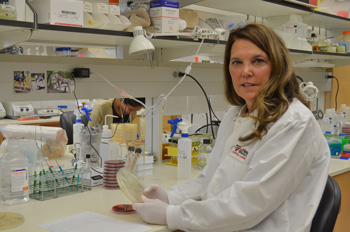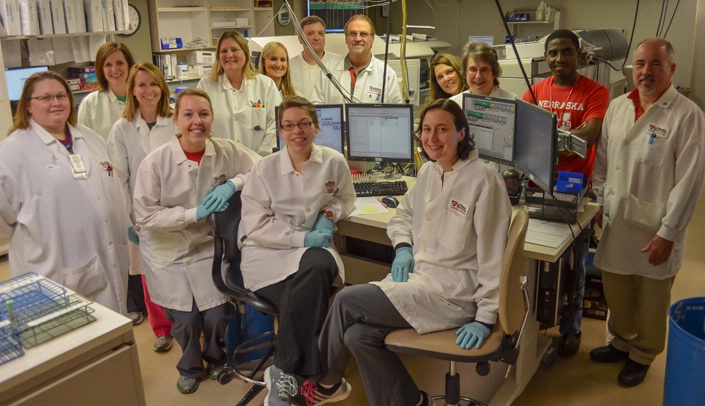They are absolutely essential to patient care. Yet they never see a patient.
They go by a lot of different names. Some call themselves clinical laboratory scientists. Others use the term medical technologists. And, oh yeah, then there’s laboratorians.
Whatever you want to call them, their behind-the-scene efforts can be the difference between life and death for patients.
“We are the faceless profession,” said Roxanne Alter, who has held a variety of laboratory positions at UNMC over the past 32 years. “Every patient is my patient, even though I don’t see them. I care about them. It’s all important to me.”
 |
Roxanne Alter may not see every patient, but she, and other laboratory workers, play a critical role in their care. |
It’s fascinating work. She works for Paul Fey, Ph.D., director of microbiology, and other UNMC researchers on special laboratory projects. She is a key member of a UNMC team performing fecal transplants on patients as a means of treating C. difficile, a nasty bacterial infection that impacts nearly 500,000 Americans per year.
“Roxanne is an integral team member,” said Alex Hewlett, D.O., who heads the fecal transplant program at UNMC. “Our service without her would not exist.”
Alter is passionate about her laboratory brethren. She feels like they are the Rodney Dangerfields of the health care world. They don’t get the respect they deserve.
“We make our work look simple,” she said. “It’s not. It’s very complicated. A lot goes into it. People are so dedicated. It amazes me.”
She shows me an inch-thick black book containing directions on how to perform more than 1,000 different laboratory tests. My head is spinning. I’m reminded why I never gave a second of thought into pursuing a science career.
“We follow directions,” Alter said. “Most of us are good cooks, too.”
She’s concerned with the challenges her profession is facing. Her colleagues are aging. The average age of a laboratorian is 56. Within a decade, many will be retired.
More students seem interested in pursuing careers in nursing than donning a white coat and working in a lab.
There’s a shortage of lab professionals. That means there are opportunities aplenty for people trying to figure out what they want to do with their lives.
Take it from Alter, it’s a great profession filled with unsung heroes.
You just need to check your ego at the door.

“Clinical laboratory scientists are an essential part of the health care team who perform testing that assists in the prevention, diagnosis, and monitoring of many health care disorders. My medical career started as a medical technologist, so I appreciate the education and hard work that the laboratory professionals do to help us take care of our patients.”
“They are involved in the performance and interpretation of virtually all of the hundreds of lab tests we order every day. We couldn't do our jobs without them. Our work would grind to a halt without them.”
“Lab technicians are an important part of the team.”
Thanks, Tom, for your article on the importance of clinical laboratory scientists to the health profession. Congratulations to those in the laboratory celebrating National Laboratory week. I am proud of my 28 years working in the laboratory beside such smart, dedicated and competent colleagues. I recognized several of them in the photo.
Thanks so much for highlighting our lab professionals!! They do an excellent job – every single day! It's a pleasure to work with such fine individuals!!
No Kidding , as this is lab week, it becomes obvious how much of the science of medicine comes down to what is done in these labs. Kudos in a big way to these un-sung heroes !!
My investigators' research efforts would not be possible without the daily support of the phlebotomists, technologists at the micro bench & SR, and the lab management team. I appreciate how friendly everyone is. Jen Cavalieri, Clinical Research Nurse, Infectious Diseases
Tom, great story and kudos to all of my laboratory colleagues who are unsung hero's in what they daily do for our patients.